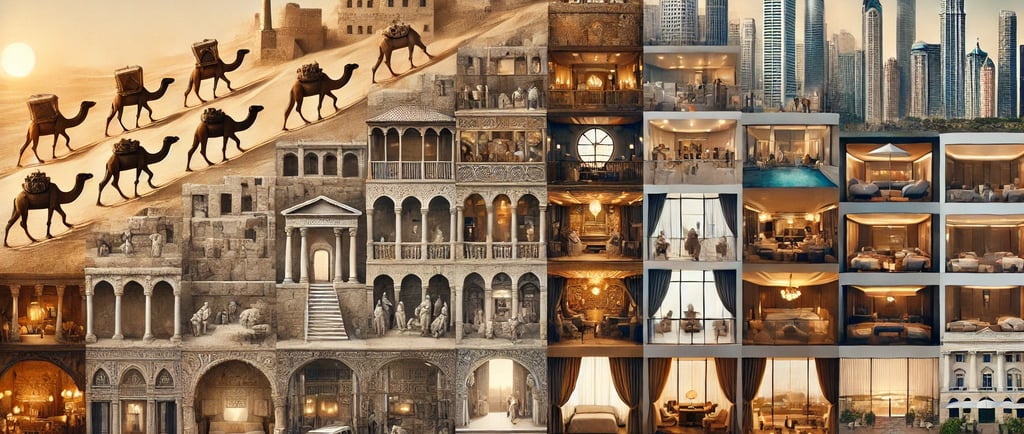The Evolution of Luxury Hotels: From Nobility to Modernity
Explore the fascinating journey of luxury hotels, symbols of elegance and comfort, as they evolve from grand accommodations for elite travelers to modern innovations that cater to diverse guest needs. Discover how societal changes and technology have shaped the luxury hotel experience.
1/5/20253 min read


Luxury hotels have long been symbols of elegance, comfort, and exclusivity. From their inception as grand accommodations for nobility and elite travelers, they have evolved into spaces that cater to diverse guest needs and desires. This transformation reflects broader societal changes, technological advancements, and shifting perceptions of what defines luxury. This article explores the fascinating journey of luxury hotels from their traditional roots to modern innovations.
The Birth of Luxury Hospitality
The concept of luxury hospitality emerged in the 19th century, with grand European hotels like The Ritz in Paris and The Savoy in London setting the stage. In the United States, establishments such as The Waldorf Astoria revolutionized the industry by blending opulence with modern conveniences. The expansion of railroads played a crucial role, allowing travelers to explore new destinations and indulge in luxurious stays. Early hospitality innovations like private suites, gourmet dining, and impeccable service standards established the foundations of luxury.
The Golden Age of Glamour
The period between the 1920s and 1950s marked the golden age of luxury hotels. Influenced by Art Deco design, these hotels became hubs for celebrities, politicians, and socialites. Glamorous ballrooms, opulent interiors, and the allure of exclusivity defined this era. The rise of hotel chains like Hilton introduced the idea of standardized luxury, ensuring guests could expect consistent service across different locations.
Redefining Hospitality in a Post War World
The mid 20th century saw significant changes in luxury hospitality. As international travel expanded, hotels began to cater to a growing class of business travelers. Modernist architecture influenced hotel design, while amenities like swimming pools and conference facilities became standard. The balance between standardization and personalization emerged as a key challenge, with hotels striving to maintain unique identities while meeting global expectations.
Enduring Traditions in Luxury
Even amidst innovation, traditional elements of luxury hotels continue to captivate guests. White glove service, fine dining experiences, and opulent design remain hallmarks of luxury hospitality. Iconic services such as butlers and classic concierges, along with formal dress codes, preserve a sense of timeless elegance. These traditions ensure that luxury hotels maintain their connection to their illustrious past.
The Rise of Contemporary Luxury
The late 20th century brought a wave of change, with boutique hotels and design focused properties challenging conventional notions of luxury. Personalization became a cornerstone of guest experiences, with lifestyle branding and experiential concepts gaining prominence. Technology also began reshaping the industry, from the introduction of online booking systems to the early stages of smart room features.
Characteristics of Modern Luxury
Today’s luxury hotels prioritize personalization and sustainability. Guests expect smart room features, wellness integration, and a focus on local cultural immersion. Digital concierges and IoT-powered amenities enhance convenience, while eco-friendly practices underscore the industry’s commitment to responsibility. Luxury has shifted from purely material opulence to creating meaningful, memorable experiences.
Innovations Shaping the Future
Technological advancements are redefining the luxury hotel experience. Mobile check ins, AI powered services, and virtual reality tours are no longer futuristic concepts but integral to guest offerings. Biometric security ensures privacy, while IoT integration enhances comfort. These innovations make luxury more accessible and adaptable to modern lifestyles.
Evolving Guest Expectations
Guests today seek more than traditional luxury they demand experiences that resonate with their values and aspirations. Casual luxury, sustainability, and digital connectivity are key priorities. The shift from formality to authentic engagement reflects broader societal trends, emphasizing comfort, flexibility, and individuality.
A Revolution in Design
Luxury hotel design has undergone a dramatic evolution, moving from ornate aesthetics to minimalist, sustainable architecture. Modern hotels such as the Aman Tokyo exemplify this shift, blending sleek minimalism with traditional Japanese craftsmanship. Biophilic design, which integrates natural elements like living walls and indoor gardens, has become a central focus for properties like Singapore’s PARKROYAL Collection Marina Bay. Local cultural influences, as seen in hotels like Six Senses Bhutan, allow guests to connect with the destination on a deeper level. Multifunctional spaces, designed for both leisure and business, cater to diverse guest needs, while the fusion of art and technology creates visually stunning environments that enhance the overall experience.
Sustainability and Ethical Luxury
Modern luxury hotels are leading the way in environmental and social responsibility. Green building standards, such as LEED certification, are being adopted by iconic properties like The Brando in French Polynesia, which operates on 100% renewable energy. Hotels are incorporating waste reduction initiatives, such as the use of biodegradable amenities and advanced recycling systems, seen in brands like Marriott’s Element Hotels. Social responsibility has also become a priority, with initiatives like Hyatt’s "RiseHY" program, which provides job opportunities for underserved youth. Ethical luxury now extends beyond the hotel walls, emphasizing fair labor practices, community engagement, and partnerships with local artisans to create authentic and sustainable guest experiences.
The Road Ahead for Luxury Hospitality
The future of luxury hotels lies in embracing next generation technology and reimagining the concept of luxury itself. Changing demographics, emerging markets, and evolving guest expectations will shape new service models. Hotels that balance innovation with tradition and sustainability will continue to thrive in an increasingly competitive market.
Discover More
Love exploring the evolution of luxury hospitality? Stay ahead with the latest insights, trends, and stories by subscribing to The Luxury Haven today. Your gateway to the world of modern luxury awaits!
Luxury Haven
Where Luxury Meets Comfort.
About us
Blog
© 2024 The Luxury Travel. All Rights Reserved.
